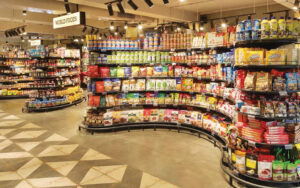Receive free Ireland updates
We’ll send you a myFT Daily Digest email rounding up the latest Ireland news every morning.
Irish dairy farmers face the prospect of having to reduce their herds in the next four months after the government said there was no chance of overturning an EU decision to apply tougher limits on nitrogen.
Farmers say 3,000 dairy producers will be affected, which could cost Ireland’s rural economy nearly €240mn, as producers would have to cull or sell cows or rush to lease more land to comply with the EU rules, just as milk prices are falling and land values are rising sharply.
Agriculture minister Charlie McConalogue told farmers on Thursday the EU would not budge from a stricter cap on the permitted levels of organic nitrogen on farms from the manure produced by their cows.
Pat McCormack, president of the Irish Creamery Milk Suppliers Association, said the government was “selling out” Ireland’s multibillion-euro dairy industry in an “abject surrender” to Brussels over the nitrogen cap.
Because of its grass-based dairy industry, Ireland has enjoyed more lenient limits under EU rules introduced in 1991 to reduce nitrogen leaching into groundwater and rivers, where it can endanger fish and make water unsafe to drink.
Irish farmers have been allowed a limit of up to 250kg of nitrogen per hectare on farms, well above the 170kg/ha permitted for most EU countries. But that came with strings attached: if water quality did not improve, Ireland would have to come down to 220kg/ha from 2024.
Virginijus Sinkevičius, EU environment commissioner, said on Wednesday that there was “no prospect” of a new derogation being made as Ireland’s latest water indicators had not improved enough.
“It was pretty obvious there were going to be no rabbits pulled out of hats,” said Elaine McGoff, head of advocacy at An Taisce, an Irish environmental NGO. “So somehow, here we are, four months out and farmers are being told they have until the end of the year to figure out what to do with all of their extra cows.”
The nitrogen cap crisis comes after Irish farmers, who see the dairy and meat industries as central to the nation’s culture, attacked the country’s Environmental Protection Agency for urging people to eat less meat in a recent social media post.
The EPA, which last year warned about the “alarming” deterioration in Irish estuary and coastal water quality, responded by swiftly deleting the post.
Tim Cullinan, president of the Irish Farmers’ Association, said the cap would have “massive ramifications for Irish farmers if it is allowed to transpire”.
Irish dairy herds have ballooned since the end of EU milk quotas in 2015 and farmers are already facing calls to reduce cow numbers by up to 200,000 to meet other emissions targets, where Ireland is lagging badly.
The IFA estimates affected farms will lose between €6,522 and €18,336 in profits. It forecasts that the overall loss to the rural economy could be €236mn and an extra 69,000 acres could be required to maintain current herd numbers.
The EU limits are set according to so-called stocking rates, which determine the amount of nitrogen permitted per hectare per year and the equivalent number of cows.
Oisín Coghlan, chief executive of Friends of the Earth Ireland, said the powerful farm lobby had “presumed they would get what they wanted, as usual” on the nitrogen rules.
Nevertheless, the Irish government is wary of upsetting farmers ahead of local and European elections next June and a general election due by March 2025.
A new Farmers’ Alliance, with links to the populist Farmer-Citizen Movement (BBB) that won provincial elections in the Netherlands in March after opposing the nitrogen rules, plans to run candidates.
Environmentalists said the EPA’s capitulation over the eat-less-meat post reflected such fears.
But Coghlan said the stark choice was “disruption now, or destruction later from climate change — and the later isn’t much later any more”.
Additional reporting by Laura Dubois in Brussels




